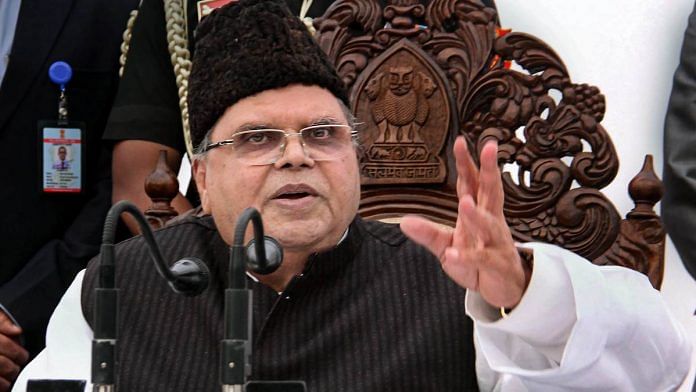The Jammu and Kashmir government, with its 59 per cent stake, has always been a majority shareholder in the J&K bank.
New Delhi: The Jammu and Kashmir Governor-chaired state administrative council’s decision to turn the Jammu & Kashmir Bank (J&K Bank) into a public sector bank (PSB) has led to a controversy with several stakeholders calling the move undemocratic, but the state government has always been a majority shareholder in the unit.
Satya Pal Malik, who is currently heading the state under Governor’s rule, made the decision last week, effectively dissolving the special, autonomous character of the bank.
The Srinagar-based bank was earlier classified as an “old private sector bank”, even though the government owns over 59 per cent stake.
As a public sector bank, the bank will now be directed by the state government, which will also have a role in appointing chairmen and other directors. This was “a covert affair” up till now as the state government has always had a role in deciding the chief.
But now the government can directly intervene in appointing chairpersons and other directors.
In a statement to a news daily, the state government said it was felt the bank should have a character of a PSU which is subject to general supervision and access for enhanced transparency in the transaction of its business to promote trust.
J&K Bank is the only one in the country to be owned by the state government, in keeping with the special status of Jammu and Kashmir. All other PSU banks are owned by the Central government.
Also read: One solution governor Satya Pal Malik failed to consider in Jammu and Kashmir
Shareholding pattern
The state government holds a majority stake of just over 59 per cent in the bank, which is listed on the bourses. Foreign portfolio investors hold 16.17 per cent while another about 12.5 per cent is with individual investors.
Mutual funds hold about 5.36 per cent and Life Insurance Corp owns 2.76 per cent.
The bank declared an annual profit of Rs 440.90 crore in the fiscal 2017-18.
Why the furore?
The decision has come under criticism from various corners. Haseeb A. Drabu, former finance minister of the state who has also served as chairman of the bank, called it a “bizarre” decision.
“The move is in contravention to the Banking Regulation Act… The board (of the bank) will have to look into the issue, it has to decide,” Drabu told ThePrint.
“That apart, the Reserve Bank of India, which is keen on keeping management and ownership separate, should intervene in the matter,” he said.
Furthermore, no major operational decisions are usually taken under governor’s rule.
“The governor here is acting like the chief minister,” said an independent banking analyst who did not wish to be identified said.
However, Manoj Kumar, legal expert and managing partner of Hammurabi and Solomon, said that the governor enjoys all executive powers in the absence of an elected government.
“He is entitled to take decisions if he feels so and if there is a genuine need for the same,” Kumar said.
Pros
The bank, which was outside the ambit of the Central Vigilance Commission (CVC) and Right to Information, will now be brought under their wings. This will boost transparency and trust among its customers.
“If the present structure is undisturbed, then there will be no cause for worry,” said Ashvin Parekh, banking expert and managing partner, APA Services.
The move will allow the government, which in any case is a majority shareholder, to take decisions on the bank’s financial health and also in the interest of the people.
“The state government will have to bear the responsibility and certain decisions which are people-centric can be taken easily,” Kumar added.
Also read: More killings, greater alienation: How the situation in Kashmir is slipping out of hand
Cons
Experts said the move could lead to an increased level of interference from the state government.
Like other PSBs, the bank could be directed to focus on certain areas of operation, like loans to micro, small and medium enterprises and expansion of banking network under the Pradhan Mantri Jan Dhan Yojana, among others.
“This, unfortunately, means that the bank will have to comply with additional reporting burden with an associated expense. There will be a change in focus,” Parekh added.



